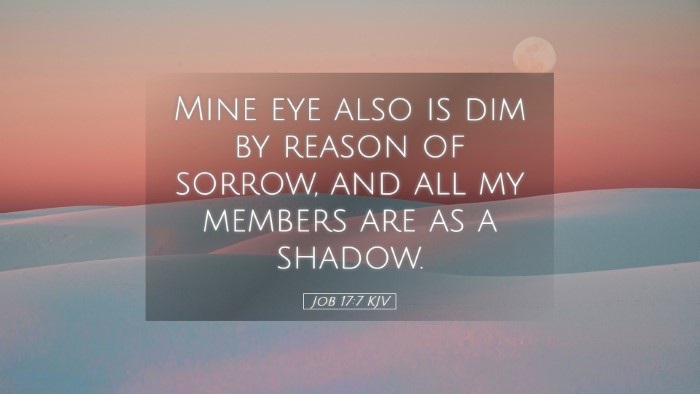Old Testament
Genesis Exodus Leviticus Numbers Deuteronomy Joshua Judges Ruth 1 Samuel 2 Samuel 1 Kings 2 Kings 1 Chronicles 2 Chronicles Ezra Nehemiah Esther Job Psalms Proverbs Ecclesiastes Song of Solomon Isaiah Jeremiah Lamentations Ezekiel Daniel Hosea Joel Amos Obadiah Jonah Micah Nahum Habakkuk Zephaniah Haggai Zechariah MalachiJob 17:7
Job 17:7 KJV
Mine eye also is dim by reason of sorrow, and all my members are as a shadow.
Job 17:7 Bible Commentary
Bible Commentary on Job 17:7
Verse: Job 17:7 - "My eye has also grown dim because of sorrow, and all my members are as a shadow."
Introduction
The verse Job 17:7 is one of deep pathos, capturing the essence of Job's suffering and the physical and emotional toll that affliction takes on him. Here, we examine the reflections by notable biblical commentators including Matthew Henry, Albert Barnes, and Adam Clarke. Their insights contribute to a holistic understanding of this poignant scripture, revealing the layers of Job's anguish and the profound implications for life, faith, and suffering.
Contextual Background
To understand Job 17:7, one must consider the broader narrative of the Book of Job, which grapples with the themes of suffering, righteousness, and the just nature of God's governance. Job, a righteous man who has lost his children, wealth, and health, reflects on his dire situation. His friends are unable to console him, leading him to express the depths of his despair.
Matthew Henry’s Commentary
Matthew Henry elucidates the dual nature of Job's predicament: both physical and spiritual. He notes that Job represents the state of a soul under extreme distress, where physical ailments are exacerbated by emotional sorrow. Henry emphasizes:
- The Dimness of the Eye: Job’s dimming eyesight symbolizes not just a physical decline but also a growing uncertainty in his spiritual vision. Despair clouded his perception of divine justice and purpose.
- Members as a Shadow: The phrase 'members are as a shadow' suggests a sense of disintegration, both of body and spirit. Job sees himself as something insubstantial, underscoring the severity of his trials.
Henry further implies that the character of suffering often includes desolation where one's vitality seems to fade away. This is not only a personal lament but resonates with believers who question God's presence in times of distress.
Albert Barnes’ Interpretation
Albert Barnes presents a theological reflection on Job’s words, identifying the implications of suffering and the isolation it brings:
- Impact of Sorrow: He notes that sorrow not only affects physical health but also spiritual clarity. Every aspect of Job’s being is affected by his overwhelming grief, emphasizing the totality of suffering.
- Shadow as a Metaphor: The idea that Job feels like a shadow indicates the fleeting nature of life and the sense of impending death. It evokes a feeling of loss – loss of vitality, purpose, and hope.
Barnes highlights the necessity for believers to understand suffering as a profound component of the human experience. His commentary urges readers to consider their own trials in light of Job’s faithfulness, serving as a testament to the Lord’s sovereignty over suffering.
Adam Clarke’s Insights
Adam Clarke provides a detailed exegesis on the emotional and psychological implications of Job's statement. He articulates:
- The Decline of Strength: Clarke explains how Job’s reference to his members being shadows indicates a profound weakening of both physical strength and moral vitality, reflecting the nature of unremitting sorrow.
- Human Fragility: Job’s condition sheds light on the fragility of human existence in the face of tribulation. Clarke reflects on how, despite his affliction, Job wrestles with maintaining hope and retaining his integrity before God.
Clarke's interpretation encourages readers to recognize the full weight of sorrow while not forsaking the possibility of divine intervention and grace.
Theological Implications
The reflections from these esteemed commentators lead us to several theological implications:
- Understanding Human Suffering: Job’s experience is a universal cannot be escaped in the human condition. His words invite us to acknowledge our struggles without minimizing their impact.
- Role of Faith in Suffering: Each commentator stresses the importance of sustaining faith amidst trials, echoing a collective message of hope that God remains present, even when perceived silence reigns.
- The Nature of Divine Justice: Job's lament questions the apparent disconnect between suffering and justice, prompting theological reflections on the nature of God’s governance in the world.
Conclusion
Job 17:7 poignantly captures the essence of human suffering and existential despair. The commentaries by Matthew Henry, Albert Barnes, and Adam Clarke enrich our understanding of Job's lament, urging pastors, students, theologians, and Bible scholars to grapple with the complexities of faith amidst trials. These reflections illustrate the depth of God’s understanding of human sorrow and the importance of community in navigating these tumultuous experiences.


